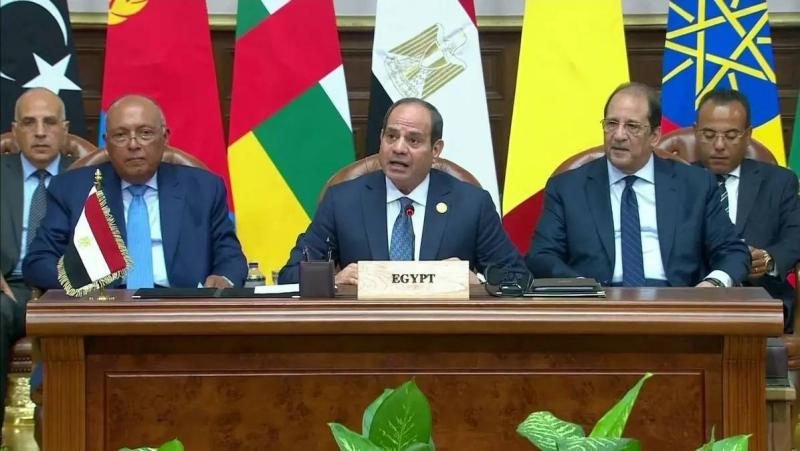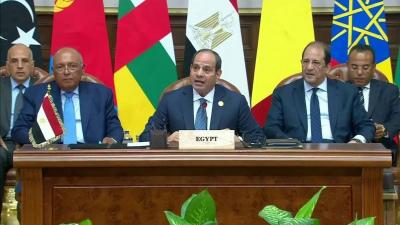Egypt initiated a new effort today, Thursday, to halt the fighting between the warring factions in Sudan and contain the humanitarian crisis, leveraging a summit of neighboring countries to revive international efforts to mitigate the conflict. Leaders of the seven neighboring countries of Sudan called in a joint statement for both parties in the conflict to adhere to a ceasefire and urged regional countries not to interfere in the conflict, agreeing to facilitate the delivery of aid.
The final statement from the Sudan Neighboring Countries Summit held in Cairo emphasized the importance of preserving the state of Sudan and its resources, preventing its disintegration. It revealed the formation of a ministerial mechanism regarding the crisis at the level of foreign ministers from neighboring countries, covering eight key points. Among these were: expressing deep concern over the ongoing military operations and the sharp deterioration of the security and humanitarian situation in Sudan, urging the warring parties to cease escalation and adhere to an immediate and sustainable ceasefire, end the war, avoid loss of Sudanese lives, and prevent damage to property. It also reaffirmed full respect for Sudan's sovereignty and territorial integrity, non-interference in its internal affairs, and emphasized handling the ongoing conflict as an internal matter, stressing the importance of preventing any external parties from intervening in the crisis to avoid prolonging it.
The final statement stressed the "importance of preserving the Sudanese state, its capabilities, and institutions, preventing its fragmentation, and the spread of chaos and organized crime around it, which could have serious implications for the security and stability of neighboring states and the region as a whole. It highlighted the need to address the current crisis and its humanitarian repercussions seriously and comprehensively, taking into account that the continuation of the crisis would lead to an increase in displaced persons and more refugees fleeing the conflict to neighboring countries, which will put additional pressure on their resources, exceeding their capacity for absorption, requiring the international community and donor countries to bear their responsibilities in allocating appropriate amounts from the aid announced during the Sudan Relief Conference held on June 19, 2023."
The statement reaffirmed the agreement to "facilitate the access of humanitarian aid to Sudan through the territories of neighboring countries, in coordination with the relevant international agencies and organizations, encourage the safe passage of aid to the most needy areas within Sudanese territory, and invite various Sudanese parties to provide the necessary protection for international relief workers. It emphasized the importance of a political solution to end the ongoing conflict and initiate an inclusive dialogue among the Sudanese parties aimed at starting a comprehensive political process that meets the aspirations and hopes of the Sudanese people for security, prosperity, and stability."
The statement also agreed to establish a ministerial mechanism regarding the Sudanese crisis at the level of foreign ministers from neighboring countries, with its first meeting scheduled to be held in Chad, to take the following actions: establish an executive action plan that includes practical and executable solutions to stop the fighting and reach a comprehensive resolution to the Sudanese crisis through direct communication with various Sudanese parties, in conjunction with existing mechanisms including IGAD and the African Union.
Furthermore, it tasked the communication mechanism to explore the necessary executive measures to address the implications of the Sudanese crisis on its future, stability, unity, and territorial integrity while preserving its national institutions and preventing their collapse. It also underscored the need to mitigate the negative impacts of the crisis on neighboring countries and discuss the mechanism of humanitarian and relief assistance to the Sudanese people.
**Egyptian Initiative**
Egypt launched today, Thursday, an initiative to mediate between the warring factions in Sudan by hosting a regional summit, the latest in a series of international efforts aimed at preventing civil war and exacerbating the humanitarian crisis in the country. Two Egyptian security sources stated that the summit aims to avoid foreign intervention in the conflict and provide a new impetus for peace talks. Diplomats noted that one of Egypt's main priorities is to reaffirm its presence in a file it feels excluded from due to other regional efforts.
Egyptian President Abdel Fattah al-Sisi warned of the seriousness of the situation in Sudan and its negative repercussions on neighboring countries. He called for an end to the ongoing fighting to preserve Sudan's institutions, addressing the root causes of the crisis, and reaching a comprehensive political solution that meets the hopes and aspirations of Sudanese citizens. He praised the neighboring countries that have welcomed hundreds of thousands of refugees and provided them with means of livelihood.
Al-Sisi revealed Egypt's plan to resolve the crisis, which includes halting escalation, starting negotiations for a sustainable solution, establishing safe corridors for the passage of humanitarian and relief aid, and launching a comprehensive dialogue among the Sudanese parties with the participation of civil and political forces to begin a comprehensive political process that meets the aspirations of the Sudanese people.
He also called for the formation of a communication mechanism arising from this conference to develop an executable practical plan for a comprehensive solution to the crisis and to coordinate with all parties in Sudan. He urged all parties in the international community to fulfill their commitments to support the neighboring countries of Sudan most affected by the crisis, noting that Egypt has received hundreds of thousands of displaced Sudanese who joined five million Sudanese already residing in Egypt.
Al-Sisi emphasized that Egypt will do everything in its power with all parties to stop the bloodshed in Sudan and help realize the ambitions of the Sudanese people to live in their homeland in security, freedom, peace, and justice, facilitating the passage of aid to Sudan through Egyptian territory in coordination with global and relief agencies. He stated that Sudan is experiencing a pivotal moment in its history and is in a significant crisis with negative repercussions on Sudan and its neighboring countries, calling for a unified vision among the neighboring countries in their positions regarding the crisis and making decisions that contribute to solving it to preserve Sudan's capabilities and the security and stability of the region.
He noted that the current crisis in Sudan is serious, and the ongoing fighting has resulted in the deaths of hundreds and the displacement of millions inside and outside Sudan, devastating the country's economy and causing social, health, and food crises.
Today, Egypt hosts the Neighboring Countries Summit to discuss ways to end the current conflict and its negative repercussions on neighboring countries, establishing effective mechanisms for a peaceful resolution of the crisis in Sudan, in coordination with other regional and international pathways. The Egyptian initiative follows a series of diplomatic attempts to achieve a permanent ceasefire, focusing on convening a session that brings together senior officials of the Sudanese army and the Rapid Support Forces in the coming weeks. It also seeks to establish a binding agreement between the two opposing factions of the Sudanese conflict lasting at least three months.
Egypt's invitation has been met with acceptance and welcome from Sudan and its neighbors, as well as several regional and Arab organizations, including the Arab League and the African Union, amid international concerns about the potential spread of the conflict to neighboring countries or the infiltration of terrorist elements into Sudan.
In this context, the head of the Sudanese Congress Party, Omar Youssef Al-Daqir, stated that the Cairo summit must emphasize a rejection of external interventions in any actions or words that could "expand" the scope of the war. He highlighted the significance of the summit as it gathers the countries "most affected by the ongoing war" in Sudan.
Ethiopian Prime Minister Abiy Ahmed stated that "Sudan is suffering from a leadership vacuum, and we should not stand idly by, as the consequences are severe for it and the region." His remarks came during his meeting with Egyptian President Abdel Fattah al-Sisi, in the first sessions of the summit, discussing ways to resolve the crisis in Sudan and the issue of the Grand Ethiopian Renaissance Dam.
Cairo had expressed reservations about deploying any foreign troops in Sudan, while seeking to form a committee from neighboring countries to support the prisoner exchange process, which would be responsible for monitoring the situation and implementing any agreements made. Volker Perthes, head of the UN mission, noted that Sudan's neighbors have been affected by the ongoing conflict, thus highlighting the importance of the meeting in Cairo to unify positions and end the war.




